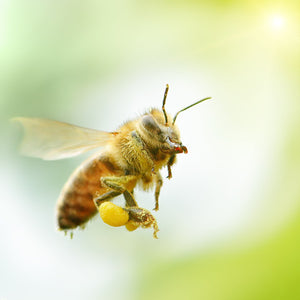Probiotics Could Help Honey Bees Exposed to Pesticides
August 08, 2017

As you may have seen in the news lately, there is national concern about the plight of the honey bee. Honey bees are responsible for more than just the local honey sold at farmer’s markets. You might call them ambassadors of agriculture. They are one of the most important natural assets in existence because they pollinate crops all over the world whether they are growing in your garden or are part of the seasonal harvest for farmers.
The American Beekeeping Federation explains that around one-third of the food you and your family eat relates in some way to honey bee pollination. These little buzzing beauties fly from flower to flower gathering nectar for their honey and spreading pollen in the process. Without the honey bee population, fruit, grains, and vegetables will at some point cease to exist.
So, what is happening to the honey bees? It’s a question that scientists are struggling to answer. In January of 2016, Natren suggested in a blog that probiotics might help the honey bee. This is based on a study done at the time, but more recent research is pinpointing specific strains of bacteria that might benefit the honey bees.
The Honey Bee Theory
It’s unclear what is happening to the honey bee population, but data shows that this species of bee is dying off. One of the most prevalent concerns at this point is a condition called colony collapse disorder, which involves bees disappearing from their hives for some unknown reason. A possible cause for this problem is neonicotinoid insecticides that are toxic to the bees. The theory is that exposure to this type of insecticide may make the bee susceptible to certain bacterial agents, heat stress and intestinal dysbiosis. This toxicity might also be at the heart of changes to the species microbiota, according to a study conducted by researchers from St. Joseph’s Hospital in London, Ontario.
The Ontario Study
For this study, trainees at the lab utilized another insect, one that has a similar makeup as the honey bee. The fruit fly is more readily available than bees and often used as a model when studying pesticide toxicity. Fruits flies have a comparable immune system and microbiota make ups, making them good test subjects.
During this study, they exposed fruit flies to commonly used imidacloprid pesticides. They found that the exposed fruit flies had changes in their microbiota, and were more prone to infection. To compensate, they administered a Lactobacillus-based probiotics to gauge their impact. The result was a higher survival rate among the exposed fruit flies treated with the probiotic. The researchers were able to conclude that a probiotic that contains Lactobacillus bacteria may help honey bees live longer despite the global use of imidacloprid pesticides.
The Decline of the Honey Bee
Years of exposing honey bees to this toxic pesticide are taking its toll on the overall population. The honey bee mortality rate has increased steadily for years and now is at about 58 percent. The gut ecosystem is critical for sustaining the population of any organism. It affects their growth, lifespan, and behavior, so the consequences of this toxicity to the bees’ microbiota are significant. Once their microbiota changes, it is passed on to the next generation of bee, as well and reversing that damage will take time.
Since science already knows that this specific type of pesticide is part of the problem, ultimately, eliminating it globally is the best solution but one that is difficult to enforce. Extinction of honey bees will have a detrimental effect on the human population. Now is the time for researchers, like the ones in Ontario, to look for alternative options that will save the honey bee. That answer might be in Lactobacillus-based probiotic like ones you see every day from Natren.
It’s becoming clear that probiotics are as important to the animal kingdom as they are for its human species. Is it enough to save the honey bee, though? It will take a lot more research to answer that question, but the results from this study are encouraging.
The post Probiotics Could Help Honey Bees Exposed to Pesticides appeared first on Natren Probiotics Blog.





Leave a comment